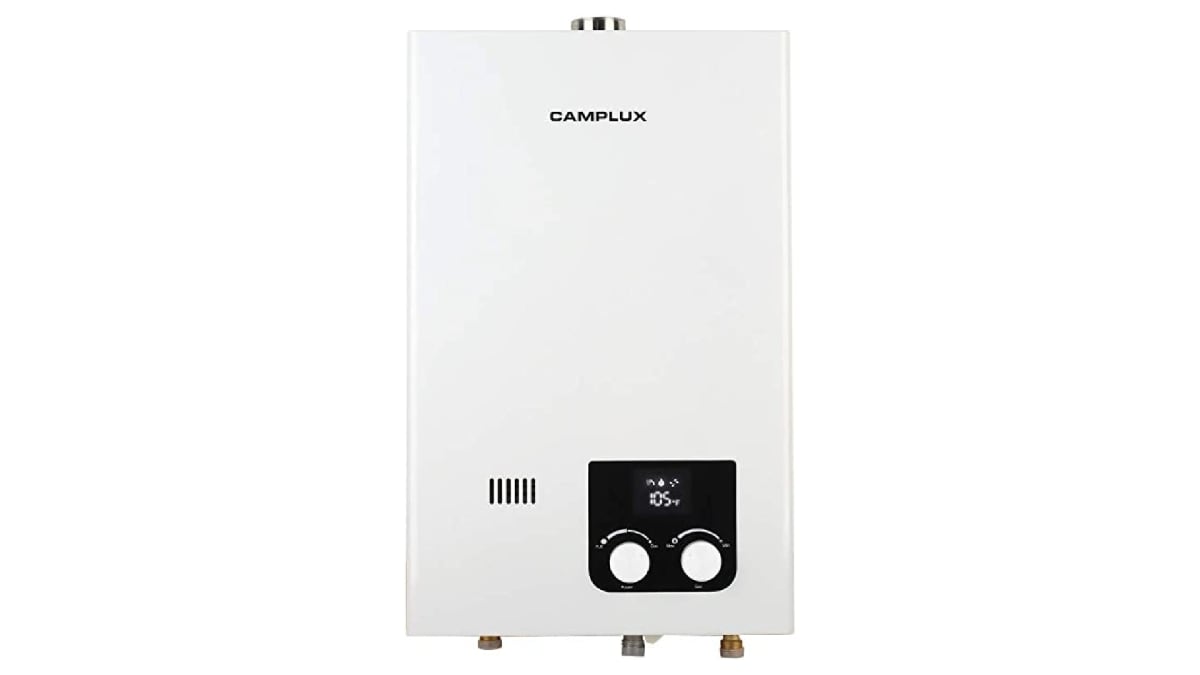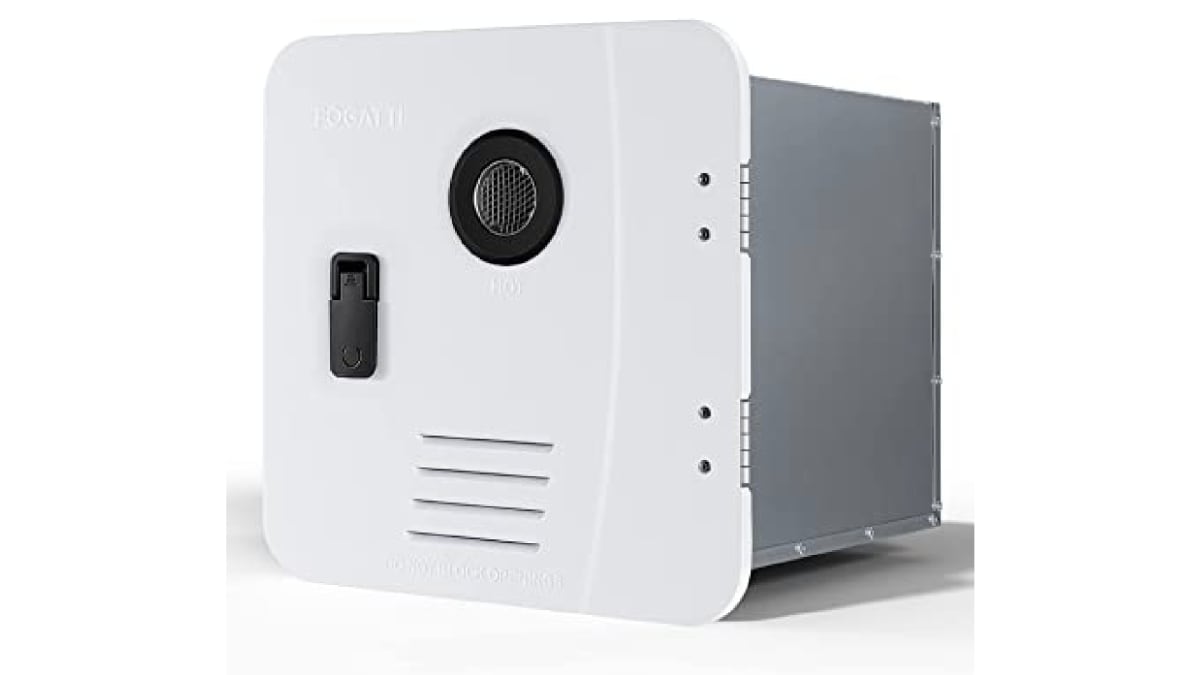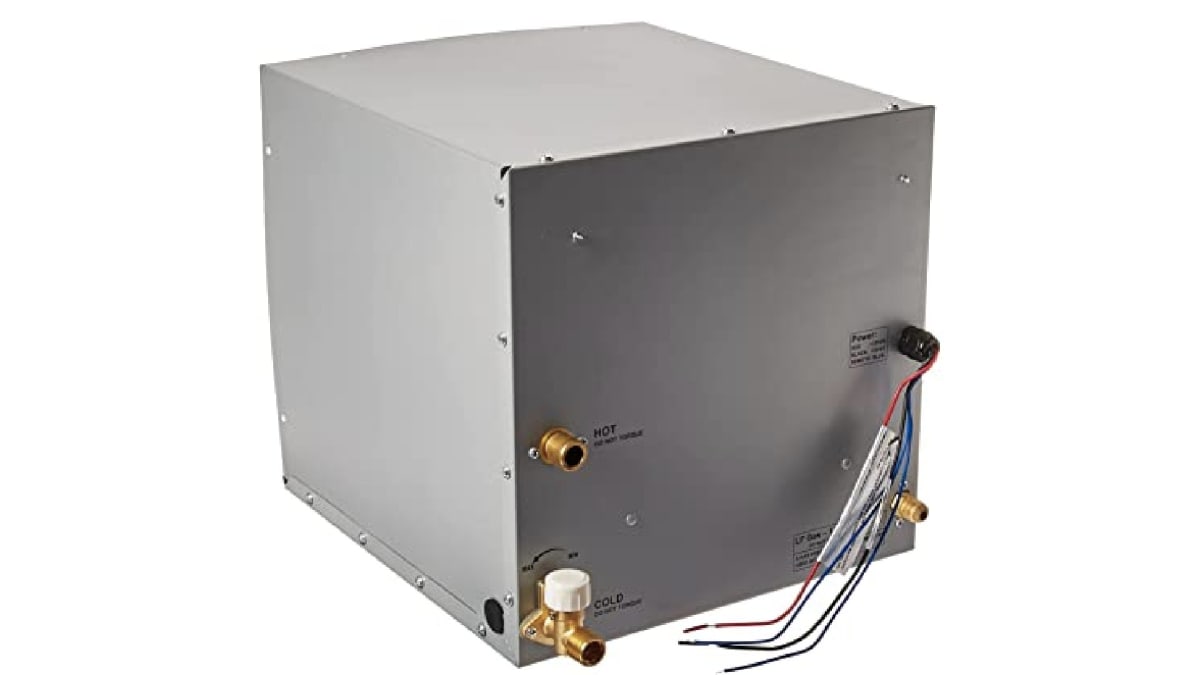Autoblog is not affiliated with the brands featured in our articles, but when you make a purchase through links on our site we may earn a commission.
Camping and hiking get the adrenaline pumping, but they’re usually pretty exhausting due to the strenuous physical activity involved. A long hot shower is a great way to unwind after a long day of adventure, as this helps your muscles relax and gets rid of every grain of dust, grime, and sweat. Most RV campers, though, don’t have access to an unlimited hot water supply, and even if they manage to get access to hot water, it’s often barely enough for one person to use.
With a great RV tankless water heater, it’s a different story, letting you instantly access an unlimited supply of running hot water. The process of purchasing the right RV tankless water heater can be quite difficult, so to save you from hours of exhaustive research we’ve compiled a list of the top-rated RV tankless water heaters as well as a comprehensive buying guide.
Our picks of the best RV tankless water heater of 2022
Camplux Tankless Water Heater: Our pick
The Camplux RV tankless water heater is powered by propane, but there’s also a gas-powered option available as well. This RV tankless water heater is designed to deliver optimal water output of 2.64 gallons per minute (GPM), which is top-notch for an RV water heater. This RV tankless water heater’s dimensions make it a compact and lightweight unit that can be mounted on your recreational vehicle’s wall, and included in its packaging are a detailed instruction manual, horizontal venting, and mounting hardware for installation. Not only will this tankless water heater save space in your RV, but it will save energy too, thanks to its eco-friendly design.
Pros
- Provides instant hot water supply
- Designed to conserve space and energy
- Offers advanced ventilation
Cons
- Somewhat difficult installation process
RecPro RV Tankless Water Heater: Great value
The RecPro RV Tankless Water Heater by Foggati is another high-performance instant water heater that offers a steady supply of hot water at your desired temperature. This RV tankless water heater is powered by propane gas and provides 42,000 BTUs (British thermal units) per hour and a flow rate of up to 2 GPM. The forced exhaust structure of this RV tankless water heater aids in maintaining clean air, while the dust net hinders impurities from entering the heating chamber. Its low water pressure startup helps protect the heater as well as make it easier to use, and this tankless water heater even comes in black and white, letting you choose the color that suits your RV.
Pros
- Easy to install and operate
- Control power, temperature, and unit with remote
- Safety features protect heater and RV
Cons
- Noisy when in use
Fogatti RV Tankless Water Heater: Another great option
This compact Fogatti RV tankless water heater is designed to satisfy the needs of RV owners, and it can provide an instant supply of hot water for an endless duration. It’s powered by propane gas, providing up to 55,000 BTU of hot water at a rate of 2.9 GPM. This RV tankless water heater is bolstered by several safety features, including anti-freeze protection, overpressure protection, and overheating and flame failure protection as well. All necessary mounting hardware is included with the purchase of this RV tankless water heater, so you should have everything you need to get that baby up and running right out of the box.
Pros
- Various safety features
- Control with wall-mounted remote
- Adjust time, temperature, and pressure
Cons
- The pressure relief valve must be purchased separately
Girard Prod Tankless Water Heater: Also consider
The GIRARD 2GWHAM Tankless Water Heater can be an excellent addition to your RV thanks to its ability to provide an instant, continuous supply of hot water. This RV tankless water heater offers great performance, providing 42,000 BTU of hot water. This RV tankless water heater is equipped with microprocessors that monitor and regulate every aspect of the heater’s functions, including flow rate and incoming and outgoing water temperature. This tankless RV water heater is very durable and is designed to stand the test of time, and no extra plumbing or gas lines are required to get the heater working.
Pros
- Easy to install and operate
- Automatic monitoring function for steady performance
- Quiet when in use
Cons
- Water heater door not included with purchase
Furrion 2.4GPM Tankless RV Gas Water Heater: Another option
This gas-powered Furrion RV tankless water heater is great for use no matter how rough your RV trips are, and its small and compact dimensions make it easy to install in the restricted space of an RV. This RV tankless water heater provides 60,000 BTU of hot water and a flow rate of 2.4 GPM, making it a solid choice for your RV. The interactive thermostat on this RV tankless water heater lets you control temperature, time, and pressure level, and it also has some excellent safety features included– over-temperature and blower block protection, a pressure relief valve, automatic shut-off, and an alarm function all help you and your RV stay safe and steer clear of danger.
Pros
- Designed to withstand RV life rigors
- Many safety features to prevent accidents
- Sensors maintain a steady hot water supply
Cons
- Installation can be tricky
Buying guide: RV tankless water heaters
Every piece of RV equipment or furnishing requires much deliberation before purchase, and an RV tankless water heater is no different. To choose the right one for your vehicle, it’s crucial to understand the factors that make an RV tankless water heater desirable… and undesirable. We’ve put together a buying guide that covers everything you should know and consider before buying an RV tankless water heater.
What is an RV tankless water heater?
An RV tankless water heater, as the name suggests, is a water heating system without a tank that heats water instantly instead of heating all water present in the tank. While standard RV heaters consist of a tank that heats a limited amount of water (i.e., the given capacity of the water tank), an RV tankless water heater provides an unlimited supply of hot water. The RV tankless water heater mechanism is pretty simple– the water is heated as it passes through the pipes of the heater. Due to their accelerated ability to provide hot water, these heaters are also known as RV instant water heaters.
What are the benefits of an RV tankless water heater?
RV tankless water heaters have many benefits, and because of this these heaters have quickly replaced the traditional RV water heaters to become the first choice of RV owners. Some of the benefits include the following:
Size
A lack of space is an unfortunate aspect of most RVs, and installing a standard heater with a tank occupies a considerable amount of space that can be counterproductive, especially for smaller RVs. A tankless water heater is a lot more compact in comparison and thus proves to be incredible for saving space, which can be great for RV owners.
Unlimited water supply
A tankless water heater ensures that there is no limit to the amount of hot water provided, offering an endless stream of running hot water for use. This differs from standard RV heaters, where a limited quantity of water is stored in the tank and there’s a constant worry about running out of hot water. This is particularly beneficial for families with RVs that might require a significant supply of hot running water. With an unlimited supply of hot water, multiple hot water tasks, like showers or washing clothes or dishes, can be carried out simultaneously without having to worry.
No smell
It’s well-known that stagnant water tends to stink, and this is the case with the stagnant water in standard RV heating tanks. Since this doesn’t apply to RV tankless water heaters (as there’s no tank, to begin with), there won’t be any smelly water thanks to its running supply of freshwater.
Save money and energy
RV tankless water heaters help conserve water, and because there’s an instant supply of hot water none is wasted. These heaters are also quite energy-efficient, and they both save you money and help protect the environment in a small way. Tankless water heaters also have an extended service life and longer product maintenance warranty compared to the standard RV water heaters, so it’s a no-brainer to go for an RV tankless water heater if possible.
Types of RV tankless water heaters
The power source determines the type of RV tankless water heater. There are predominantly two types of RV tankless water heaters– electric-powered and gas-powered.
Electric-powered RV tankless water heater
Electric-powered RV tankless water heaters are powered by electricity obtained from either the RV’s electrical system or solar panel, or even from a ground source or external generator (in the case of a stationary RV). Electric-powered models offer many benefits, including ease of installation, cost-effectiveness, and an environmentally friendly solution.
Gas-powered RV tankless water heater
Since RVs don’t have access to natural gas, gas-powered RV tankless water heaters rely on kerosene and propane for heating. This type of heater is a lot more affordable compared to electric units, but there’s a significant installation cost involved– ventilation is required for a safe operation, meaning vents need to be installed along with the heating unit. Unlike electric units, gas-powered RV tankless water heaters are not environmentally friendly, as they release a small number of greenhouse gasses when in use.
How to choose an RV tankless water heater
When it comes to purchasing an RV tankless water heater, the final decision ultimately rests with you. Here are a few things to consider to help you make a great choice:
Size
RV tankless water heaters are much more compact than their standard counterparts. Think about the size and how the heater will fit in your RV to choose an appropriate unit.
Water flow rate
The water flow rate of a water heater is the amount of water, usually measured in gallons, heated, and supplied in a minute. Because of this, the water flow rate is measured in gallons per minute.
The water flow rate of an RV tankless water heater ranges from one to ten gallons per minute. The higher the water flow rate, the higher the price of the heating unit. On average, a heater with a water flow rate of two to three gallons per minute is an excellent choice for a family of RV campers.
Safety factor
Accidents are unfortunately common with heating units, whether they’re electric-powered or gas-powered. In the case of RVs, these accidents can prove to be lethal. To avoid danger, it’s advised to choose an RV water heater with self-limiting damage and other failsafe features that can prevent accidents.
Budget
Budget is always a crucial factor, no matter what it is you’re buying. RV tankless water heaters can be considerably more expensive than their standard counterparts, and the pricing of tankless units varies a great deal– RV tankless water heaters can range from $200 to $1,000 depending on the unit’s specifications. A solid RV tankless water heater can be purchased for $250 to $400, but if you want a more premium option you might have to spend up to $1,000, and sometimes even more than that.
People also asked
Q: Is a condensing RV tankless water heater better than a non-condensing one?
A: Non-condensing RV tankless water heaters feature a single heat exchanger, while a condensing one uses a dual heating mechanism in a double heat exchanger. The heat is recycled in the latter, making condensing RV tankless water heaters a lot more efficient. Lower exhaust energy and higher efficiency make this kind of heater a better option.
Q: Is it possible to replace an existing standard RV water heater with a tankless one?
A: It is, as tankless water heaters occupy considerably less space and can be easily fixed in place of a standard heater.
Q: Do RV tankless water heaters require maintenance?
A: Yes, RV tankless water heaters require annual maintenance from a professional to keep the heater in top condition for the future. Removing mineral buildups and fixing wear and tear proves instrumental in enhancing the service life of an RV tankless water heater.
Q: Do RV tankless water heaters require neutralizers?
A: Yes, the condensing type of RV tankless water heaters requires neutralizers to extend the life of drain pipes.
Q: How often do RV tankless heaters require descaling?
A: An RV tankless water heater should ideally be descaled twice a year, particularly in the case of hard water and high-temperature settings, but a yearly descaling should be fine too.
Source: www.autoblog.com





